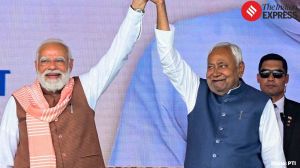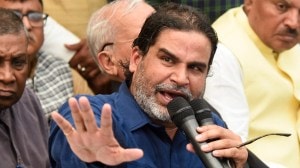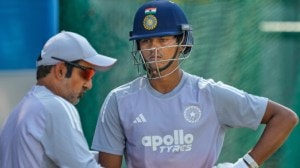Down serpentine lanes leading away from both Manikarnika and Dashashwamedh Ghat in Varanasi, at the end of a bylane bordered by walls with fading paintings of kings, a traditional wooden door opens into an old building with half-a-dozen small rooms and two courtyards, one of them facing the Ganga. In one of the oldest living cities in the world, among the few signs of the modern world having touched this house is a refrigerator and a TV set. Inside reside a cow and an ox, and 40 family members, one of them this holy city’s ‘Dom Raja’.Jagdish Chaudhary, 49, remembers few days in his life like April 26, when he accompanied Prime Minister Narendra Modi to the Varanasi Collectorate to sign on the PM’s nomination papers for re-election from Varanasi parliamentary constituency. Chaudhary says he is not associated with any political party and was surprised when “somebody” — he won’t say who — approached him and asked if he would be a proposer for Modi.
One of the first things Chaudhary did was rush out to buy a pair of trousers and get a shirt tailored for the day.

The clothes now lie in a wooden almirah in a small, dark, damp room. He shares the room with his wife, son and daughter; shelves weighed down by basic home utilities; and two cots, under one of which lies an earthen pot. Chaudhary says he prefers having cool water from it still, rather than the fridge. Small windows with iron grilles let in faint light.
Two large stone tiger statues in the courtyard facing the Ganga are the only signs that here resides a “king”. Chaudhary is not sure who built the statues, but they have been around since the time his grandfather was the Dom Raja and constructed the house.
Changes are few in the lives of Doms, who have for generations been responsible for lighting pyres at the Manikarnika and Harishachandra Ghats in Varanasi. More than a thousand of them live around these parts, with Chaudhary the ‘chief cremator’, as “the inheritor of the legacy of mythological king Kaaloo Dom”.
It is believed that the people whose pyres he lights achieve moksha and are liberated from the cycle of life and death. Chaudhary lights the pyre from an agnikund at Manikarnika Ghat, and as the traditional keeper of that fire, ensures it never goes out.
As Dom Raja, Chaudhary also resolves any disputes arising at the ghats as well as decides the roster of other Doms for lighting the pyres.
Story continues below this ad
 Jagdish Chaudhary shares his ancestral house down a narrow lane (below) leading from the ghats, with 40 family members, an ox, and a cow. (Express photo by Anand Singh)
Jagdish Chaudhary shares his ancestral house down a narrow lane (below) leading from the ghats, with 40 family members, an ox, and a cow. (Express photo by Anand Singh)
It is from Manikarnika’s agnikund that Chaudhary is supposed to also get fire for the family’s kund, or stove, located in the verandah. They don’t use LPG because the food cooked on the kund is tastier, Chaudhary says.
“We live a very simple life,” stresses Chaudhary, who took over as Dom Raja 15 years back, after the death of his father. “This is my ancestral home. I am not educated much (he studied till Class 5) and a fixed percentage of daan (donation) collected at ghats from relatives of the dead is my family’s only source of income.”
Considered “the lowest of the low” among castes, the Doms have long struggled to break free from their past. Chaudhary says only four people in his community have government jobs, and that his ancestors, including his father, faced untouchability. “When they passed down a road, people would curse. They were not allowed to touch utensils at houses of other communities and, in the market, they would be offered water only in their chullu (cupped palms).”
The Doms have never thought any politician could help change that, and so, Chaudhary says, the Modi invite came as a surprise. Saying he would vote for the BJP, he adds, “Modiji has taken remarkable initiatives in public interest. He has protected the country from terrorism too.”
Story continues below this ad
Noting how people remember Doms only when they want them to cremate a body, he says, “I feel proud that for the first time, the importance of the community has been recognised, and that too by the PM. When he thanked me for becoming his proposer, I did not make any request. But if he becomes prime minister again, and I get a chance to meet him, I will request him to develop more facilities at Manikarnika and Harishchandra Ghats and do something for the financial and educational empowerment of our community.”
A fellow Dom, Rajesh Chaudhary, 40, says he has never voted, but will also do so for Modi this time, impressed with his government’s “diplomatic policies” and “development works” in Varanasi and also, for being the first PM “to recognise our work”.
Rajesh and his six brothers all work as Doms. “I started doing this work at the age of 17. Today I earn Rs 500-600 every day as my share from donations. No political party, MLA, MP or minister has ever expressed any concern for our community. They do not need our votes because we are a few hundred and confined to a small area in Varanasi,” he says.
Rajesh lives in a small room at the adjacent Meer Ghat. The little space left in the room after a bed is taken up by an iron box in which he keeps his daily earnings. A table fan rests on the box. On a wooden shelf is kept a photograph of Lord Shiva. With his family growing, five years back, Rajesh shifted his parents, wife and five children to a rented house in Faizabad. Now alone, he eats out every day.
Story continues below this ad
Another Dom, Guru Prasad Chaudhary, 54, says he has no hopes from Modi. “We have spent our life at this ghat and my next generation will do the same because we have to start work as Doms at an early age in order to survive. I stopped voting 10 years back,” says Guru Prasad, breathless from the 27 stairs he has just climbed up after performing the last rites of a body.
Guru Prasad’s own nephew Karan dropped out of school at the age of 13 to start working as a Dom. Now 23, he lives with Guru Prasad at Meer Ghat, but says he goes there rarely. “I spend maximum time here at this ghat. During summer days like now, most bodies come early morning, or in the evening and night. I am trying to get as much work as possible to save money so that I can throw a good party for community members after my wedding in October this year,” Karan says.
When he needs a break, he heads to a cot in a door-less room at the ghat, which has a kuchcha floor. Dogs and cattle keep walking in and out of the room.
Talking about his eldest son who scored 60% in the recently declared Class 10 state board results, Rajesh hopes he can continue studying and get a government job. Rajesh also wishes someone would talk about jobs, education for their children. “We are Dalits but don’t get even the benefit of reservations because we have no educational qualifications,” he says, as he makes an entry for the Rs 500 daan he just received for a cremation.
Story continues below this ad
However, there is some confusion regarding the caste status of Doms. While some among them as well as locals consider them Dalits, Dom Raja Chaudhary claims his ancestors were Brahmins. He also claims the caste discrimination against them is lessening now. “People in the city invite me to their functions and accept my invitation too. People from several castes and professions had come when my daughter got married last year. But still there are a few families living near Manikarnika Ghat for whom we are untouchable.”
Chaudhary’s nephew Abhay, who is in Class 7, says he often visits school friends at their home, and they come visiting too; “the profession of my family does not matter to them”. However, he adds, “I do not want to do this work. I want to become a government officer.”
Still, at least in the invitation to Chaudhary, the prime consideration was the community he represents. The BJP’s Kashi region vice-president, Dharmendra Singh, says Chaudhary was requested to become a proposer for the PM because he represents the “lower strata” and it suited the party’s ideology of “Antyodaya (upliftment of the weakest sections of society)”, social equality and “Sabka Saath, Sabka Vikas”.

 Jagdish Chaudhary shares his ancestral house down a narrow lane (below) leading from the ghats, with 40 family members, an ox, and a cow. (Express photo by Anand Singh)
Jagdish Chaudhary shares his ancestral house down a narrow lane (below) leading from the ghats, with 40 family members, an ox, and a cow. (Express photo by Anand Singh)
 Jagdish Chaudhary shares his ancestral house down a narrow lane (below) leading from the ghats, with 40 family members, an ox, and a cow. (Express photo by Anand Singh)
Jagdish Chaudhary shares his ancestral house down a narrow lane (below) leading from the ghats, with 40 family members, an ox, and a cow. (Express photo by Anand Singh)





























